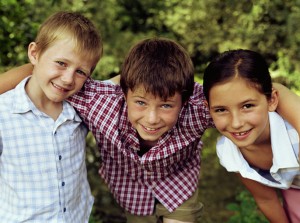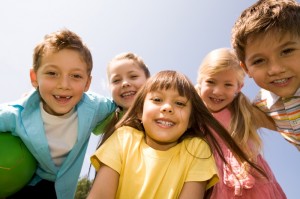
Most children develop social skills much like ducks learn to swim. Simply by being immersed in interactions with others they learn how to interpret messages they receive from other people and to respond appropriately. From birth most babies are hard-wired to focus on, interpret and respond to social interactions from others. Most children do not need these skills to be specifically taught. As they interact first with parents, then with other adults and later with their peers they learn to interpret and respond appropriately to the signals they receive from others.
Social skills are important in speaking with others, sharing activities, taking turns, developing friendships and relationships. They are important at home, at school, in the community and in play situations. Children who have difficulty interpreting social information, thinking in social way and responding appropriately in social situations often have difficulty making and maintaining friendships and being accepted by their peers. This can impact on emotional development and educational success. If social skills continue to be an area of difficulty, adult relationships can also be affected.

Many children with disabilities such as autism spectrum disorder, communication difficulties and attention deficits may find developing social skills difficult. Research has shown that without effective teaching of social skills to children with social skills difficulties these children are at risk of emotional and mental health problems as they get older. The need for friendships and the need to feel accepted by others is significant in every child's development.
The good news is that social skills can be taught. While some children don't just absorb social skills from interacting, they can learn these skills with specific teaching.
The team at Talking Matters recently spent some time in training with Mark LeMessurier, co-author of the “What's the Buzz?” social skills program, learning how to administer this program in order to help children learn to develop social skills. Mark, an experienced teacher, counsellor and mentor developed the program alongside Madhavi Nawana Parker a behavioural consultant specialising in work with children with Asperger’s syndrome, attention deficit disorders and learning difficulties. The program is designed for children from eight to twelve years and can be modified for younger children.
Mark discussed what research has shown to be key components of an effective social skills program. Research has shown that effective programs have the following characteristics:
Sequenced: the program will follow a logical step-by-step breakdown of each skill
Active: the program uses role-plays and behavioural rehearsal with feedback
Focused: the program dedicates periods of time to solely teaching each specific skill
Explicit: the program teaches a specific skill in each session.
What's the Buzz? has been designed to include all these characteristics.

What's the Buzz? includes 16 lessons which cover the following topics:
- meeting people and exiting
- getting attention
- following instructions
- being friendly
- competition winning and losing
- identifying feelings
- feelings and the warning signs
- feelings and thinking positively
- feelings and ideas to create well-being
- empathy responding to others
- handling worry
- dealing with disappointment
- responding to bullying
- the connecting art of conversation
- learning to fit in
- giving and receiving compliments.
The What's the buzz program includes structured lessons and reproducible materials for each lesson. The program can be run by a range of different professionals experienced in working with children. It can be run in group settings and also on an individual basis.
Each lesson introduces the students to the topic and the skills to be learnt. It then gives students an opportunity to practice and to show that they understand the new skill set. There are quizzes and activities which allow children to practice and consolidate skills while building relationships and having fun together. There are also supportive ideas and information which are provided to parents to help them support and consolidate their child’s new skills at home.
If you would like to find out more about What's the buzz and download some of the resources available please visit www.what's the buzz.net.au
The Talking Matters team plan to offer the What's the Buzz program to students during the summer holidays. More information will be available from the office soon.
If you would like further information about developing social skills why not check out some of the resources on our website or have a look at the related posts below.
You might also like to download our free feelings book to help your child learn to understand their feelings and those of others.
Talking Matters provides speech pathology, occupational therapy and psychology services to kids of all ages in Adelaide, South Australia. To find out more about our team and what we do browse our website and see how we can help your family.
Related Blog Posts
If you liked this post you may also like:
Winter Play - Supporting Your Child's Development
What is ADD and ADHD?
Create and learn
Sleep - Supporting You Child's Development



